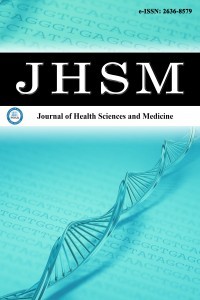1.
GBD 2021 Obesity Collaborators. Global, regional, and national burden of disease attributable to high body-mass index in 204 countries and territories, 1990-2021: a systematic analysis. Lancet. 2024;403(10428): 1015-1034. doi:10.1016/S0140-6736(24)00411-2
2.
Wolever RQ, Best JL. Mindfulness-based approaches to eating disorders. In: Didonna F, editor. Clinical handbook of mindfulness. New York: Springer; 2009. p. 259-287.
3.
Zavala GA, Ainscough TS, Jimenez-Moreno AC. Barriers to a healthy diet and physical activity in Mexican adults: results from the Mexican Health and Nutrition Survey. Nutr Bull. 2022;47(3):298-306. doi:10.1111/nbu.12568
4.
Soylar P, Kadıoğlu BU. Yetişkin bireylerin sağlık okuryazarlığı ve obeziteyle ilişkili bazı davranışlarının incelenmesi. Sak Tıp Derg. 2020; 10(2):270-276. doi:10.31832/smj.700979
5.
Çın A, Akkan T, Dağdeviren M, et al. Valuation of the relationship of health literacy and healthy eating attitude in obesity. Turk J Fam Pract. 2022;26(4):154-163. doi:10.54308/tahd.2022.42104
6.
Vidgen HA, Gallegos D. Defining food literacy and its components. Appetite. 2014;76:50-59. doi:10.1016/j.appet.2014.01.010
7.
Yilmazel G, Çetinkaya F. Relation between health literacy levels, hypertension awareness and control among primary-secondary school teachers in Turkiye. AIMS Public Health. 2017;4(4):314-325. doi:10.3934/publichealth.2017.4.314
8.
Speirs KE, Messina LA, Munger AL, Grutzmacher SK. Health literacy and nutrition behaviors among low-income adults. J Health Care Poor Underserved. 2012;23(3):1082-1091. doi:10.1353/hpu.2012.0113
9.
Bandura A. Self-efficacy: The exercise of control. New York: W H Freeman/Times Books/Henry Holt & Co; 1997.
10.
von Wagner C, Knight K, Steptoe A, Wardle J. Functional health literacy and health-promoting behaviour in a national sample of British adults. J Epidemiol Community Health. 2007;61(12):1086-1090. doi:10.1136/jech. 2006.053967
11.
Nakamura T, Akamatsu R, Yoshiike N. Mindful eating proficiency and healthy eating literacy among Japanese mothers: associations with their own and their children’s eating behavior. Nutrients. 2021;13(12):4439. doi:10.3390/nu13124439
12.
Nutbeam D, Lloyd JE. Understanding and responding to health literacy as a social determinant of health. Annu Rev Public Health. 2021;42:159-173.
13.
Sørensen K, Pelikan JM, Röthlin F, et al. Health literacy in Europe: comparative results of the European health literacy survey (HLS-EU). Eur J Public Health. 2015;25(6):1053-1058. doi:10.1093/eurpub/ckv043
14.
Okyay P, Abacıgil T. Türkiye sağlık okuryazarlığı ölçekleri güvenilirlik ve geçerlilik çalışması. T.C. Sağlık Bakanlığı; 2016. Accessed October 2, 2024. Available from: https://ekutuphane.saglik.gov.tr/Yayin/530
15.
Framson C, Kristal AR, Schenk JM, et al. Development and validation of the mindful eating questionnaire. J Am Diet Assoc. 2009;109(8):1439-1444. doi:10.1016/j.jada.2009.05.006
16.
Köse G, Tayfur M, Birincioğlu I, et al. Adaptation study of the mindful eating questionnaire (MEQ) into Turkish. J Cogn-Behav Psychother Res. 2016;1. doi:10.5455/JCBPR.250644
17.
Stroebele-Benschop N, Damms-Machado A, Milan F, et al. Gender differences in the outcome of obesity treatments and weight loss maintenance: a systematic review. J Obes Weight Loss Ther. 2013;3:1-11. doi:10.4172/2165-7904.1000176
18.
Tiwari A, Balasundaram P. Public health considerations regarding obesity. In: StatPearls [Internet]. Treasure Island (FL): StatPearls Publishing; 2025.
19.
van Strien T. Causes of emotional eating and matched treatment of obesity. Curr Diab Rep. 2018;18(6):35. doi:10.1007/s11892-018-1000-x
20.
Zervos K, Koletsi M, Mantzios M, et al. An eight-week mindful eating program applied in a Mediterranean population with overweight or obesity: the EATT intervention study. Psychol Rep. 2022;125(2):1011-1040. doi:10.1177/0033294120988104
21.
Karaca V, Rakıcıoğlu N. Yetişkinlerde yeme farkındalığı, beslenme bilgi düzeyi ve antropometrik ölçümlerin değerlendirilmesi. HÜ Sağlık Bil Fak Derg. 2024;11(3):671-689. doi:10.21020/husbfd.1443850
22.
Barışkan H, Karakoç Kumsar A. Sağlık bilimleri fakültesi öğrencilerinde abdominal obezite sıklığı ve yeme farkındalık düzeyleri. Koç Üniv Hemş Eği Araş Derg. 2020;17(2):162-169. doi:10.5222/HEAD.2020.44452
23.
Köse G. Üniversite öğrencilerinin yeme farkındalığının üzerine bir araştırma [doktora tezi]. Ankara: Başkent Üniversitesi Sağlık Bilimleri Enstitüsü; 2017.
24.
Mason AE, Jhaveri K, Cohn M, et al. A pilot randomized trial of a mindful eating intervention targeting consumption of sugar-sweetened beverages. Obesity. 2020;28(6):1100-1106.
25.
Hamurcu P, Taş D. Sağlık çalışanlarında yeme farkındalığı düzeyinin belirlenmesi: Zeynep Kamil Kadın ve Çocuk Hastalıkları Eğitim Araştırma Hastanesi örneği. Batı Karadeniz Tıp Derg. 2022;6(1):96-105. doi:10.29058/mjwbs.1030982
26.
Kristeller JL, Wolever RQ. Mindfulness-based eating awareness training for treating binge eating disorder: the conceptual foundation. Eat Disord. 2011;19(1):49-61.
27.
Tapper K, Shaw C, Ilsley J, et al. Exploratory randomised controlled trial of a mindfulness-based weight loss intervention for women. Appetite. 2009;52(2):396-404. doi:10.1016/j.appet.2008.11.012
28.
Kao TSA, Wei CN, Chen ML, et al. Effects of mindfulness-based interventions on obesogenic eating behaviors: a systematic review and meta-analysis. Obes Rev. 2025;26(3):e13860. doi:10.1111/obr.13860
29.
Kausman R, Polivy J. If not dieting, then what? Psychol Today. 2018;51(1): 42-48.
30.
Kim H, Xie B. Health literacy in the eHealth era: a systematic review of the literature. Patient Educ Couns. 2022;105(6):1076-1087.
31.
Özkan S, Dikmen AT, Hakan K, et al. Prevalence and determiners of health literacy in Turkiye. Turk Sağl Okuryazar Derg. 2020;1:27-39. doi: 10.54247/SOYD.2020.3
32.
Kaya M, Yılmaz Ö. Bireysel özellikler, sağlık okuryazarlığı ve genel sağlık durumu arasındaki ilişki. MAKÜ SOBED. 2020;33:113-122. doi: 10.20875/makusobed.820452
33.
Sala M, Shankar Ram S, Vanzhula IA, Levinson CA. Mindfulness and eating disorder psychopathology: a meta-analysis. Int J Eat Disord. 2020;53(6):834-851. doi:10.1002/eat.23247
34.
Treasure J, Schmidt U, Macdonald P. The clinician’s guide to collaborative caring in eating disorders: the new Maudsley method. 2<sup>nd</sup> ed. London: Routledge; 2020.
35.
Kickbusch I, Pelikan JM, Apfel F, Tsouros AD. Health literacy: the solid facts. Copenhagen: WHO Regional Office for Europe; 2013.
36.
Chen X, Hay JL, Waters EA, et al. Health literacy and use and trust in health information. J Health Commun. 2021;26(12):911-920. doi:10.1080/ 10810730.2018.1511658
37.
Carbone ET, Zoellner JM. Nutrition and health literacy: a systematic review to inform nutrition research and practice. J Acad Nutr Diet. 2012; 112(2):254-265. doi:10.1016/j.jada.2011.08.042
</ol>
</div>
<p>

